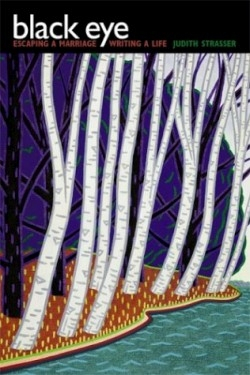Black Eye
Escaping a Marriage Writing a Life
The literary value of the memoir has often been questioned, and this book adds its own arguments to the debate. In an engaging narrative, the author reconstructs the last year of her marriage, interweaving past journal excerpts with present moments and memories of her childhood. The result is a complete portrait of how she gathered the courage to leave an abusive marriage and to synthesize her past and present into a whole identity—and then to write about it.
As Strasser relives the year she spent agonizing over whether to save or escape her marriage, she illustrates how she became a writer. She began writing as a young, idealistic woman traveling the country with her husband Stu in the early 1970s. However, her fragile efforts were thwarted by his intolerance. She devised an idea for a book on Americans’ attitudes toward land, and began her research; alas, she never completed her plan as she was drawn into marriage, settling down, having children, and becoming Stu’s punching bag.
The rhythm of the memoir is disconcerting at first. Strasser begins writing in the present from a writer’s retreat; then her memory jumps back and forth between the recent past, the distant past, and the present. Fortunately, the book settles into a smoother flow, with memories of the author’s childhood and college days sprinkled in when relevant.
Strasser, a poet, conducts poetry and memoir writing workshops for adults and children, and has been senior producer and interviewer for To the Best of Our Knowledge, a nationally distributed public radio program. Her poems and essays have appeared in literary magazines and anthologies like The Kenyon Review. Her book-length collection, How to Stay Alive, has been a finalist in several national book competitions.
For readers who may find themselves trapped in the confusion of a bad relationship, Strasser becomes a friend they can trust, who unabashedly reveals her insecurities and vulnerabilities. She voices her frustration with her old self, allowing readers to acknowledge their own frustration: “I want to say to this woman, go already. Leave. It’s tedious, coming back to the computer again and again to find that you are still stuck in a relationship that is obviously abusive, obviously past time to end. It’s embarrassing, knowing that readers will see how stuck you were.”
At the same time, her book offers hope to those who have ended relationships. “The question for me,” Strasser writes, “is not, ‘should I leave?’ It’s—still, nearly eleven years later—‘was I right to have left?’” The answer, author and reader discover together, is a resounding “yes.” This memoir is valuable, not only to readers struggling with relationships, but also to readers who simply enjoy a good story.
Reviewed by
Jennifer Hoffman
Disclosure: This article is not an endorsement, but a review. The publisher of this book provided free copies of the book to have their book reviewed by a professional reviewer. No fee was paid by the publisher for this review. Foreword Reviews only recommends books that we love. Foreword Magazine, Inc. is disclosing this in accordance with the Federal Trade Commission’s 16 CFR, Part 255.

